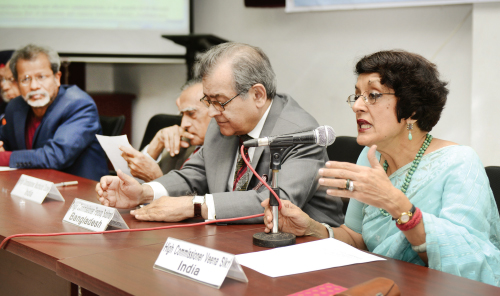Former diplomats for upholding democratic values
Former diplomats of Bangladesh and India on Saturday affirmed their determination to work for protecting ‘democratic values and rights’ of the peoples of the two countries as a two-day summit concluded in Dhaka adopting a nine-point declaration. The former high commissioners, who served in Dhaka and New Delhi, called upon the governments of Bangladesh and India to strengthen their cooperation on all security-related matters. Dhaka University department of international relations organised the first such summit in collaboration with India-Bangladesh Foundation, attended by 13 former high commissioners and three deputy high commissioners of India and Bangladesh. DU professor Imtiaz Ahmed chaired the business sessions. ‘This would encourage the governments of Bangladesh and India to intensify their efforts to strengthen their relationship by taking a holistic approach in addressing bilateral issues and challenges,’ said Imtiaz while reading out the Dhaka declaration adopted on the day.
The document would be sent to the policymakers of the two governments, he added. In the document, the former high commissioners called for deepening and widening economic engagement between the two countries with particular focus on free and increased flow of goods and services, including investment and financial services. The retired diplomats identified lack of trust and confidence in each other as being a major problem in the Indo-Bangla relationship. The declaration had no mention of any specific issues like Teesta water sharing, ratification of the 1974 Land Boundary Agreement by India and border killing by Indian Border Security Force and transit although these were widely discussed in the business sessions.
Retired high commissioners both Bangladesh and India on Friday decried India’s foot dragging on the Teesta water sharing treaty and ratification of the land boundary deal singed between the two neighbours in 1974. They said that the responsibility lay with India that the two issues, which were crucial for Bangladesh, could not be settled yet although New Delhi made commitments several times over the Teesta deal and ratifying the Indira-Mujib Land Boundary Agreement, which had already been ratified by Bangladesh. They also discussed bilateral security issues and rise of Islamist militancy, particularly the October 2 bomb explosion in West Bengal’s Burdwan town.
On the sidelines of the business session, Pinak Ranjan Chakravarty, former Indian high commissioner in Dhaka, said India expected Bangladesh to return to an ‘ideal democracy’. ‘Everyone wants a good election and an effective opposition in parliament,’ he said while reflecting on the Bangladesh’s one-sided polls held on January 5 this year. Humayun Kabir, former Bangladesh high commissioner in New Delhi, told reporters that the Indian diplomats during the discussions had said that they should have mutual respect for democratic values and rights of the people of each country. Asked for comments on the political situation in Bangladesh, Dev Mukharji, former Indian high commissioner in Dhaka, said Bangladesh’s internal matters were not discussed in the summit.
News Content Courtesy: http://newagebd.net











